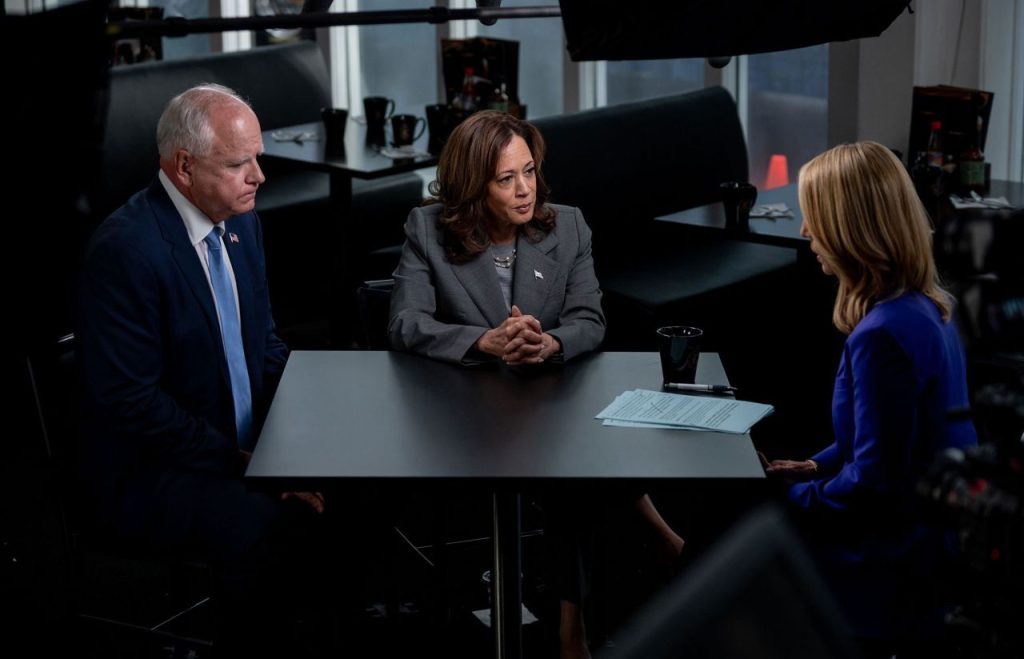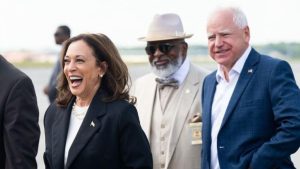Harris defends policy shifts on key issues in first interview
3 min read

In her first major interview since announcing her presidential bid, Vice-President Kamala Harris defended her evolving stances on significant issues such as immigration and climate change. This interview comes at a crucial moment as she positions herself for the upcoming presidential race.
Harris faced questions from CNN’s Dana Bash about the changes in her policy positions since her initial 2019 presidential campaign. Despite acknowledging shifts in her views, she emphasized that her core values remain unchanged. “The most important and most significant aspect of my policy perspective and decisions is my values have not changed,” she stated.
The interview, which was pre-recorded and shared with her running mate, Minnesota Governor Tim Walz, drew criticism from former President Donald Trump, who described it as “BORING!!!” on Truth Social.
A key topic was the Biden administration’s economic performance amid rising inflation and high living costs, an area where polls suggest that many voters prefer Trump’s approach. However, the most intense scrutiny was directed at Harris’s shifting policy positions.
Regarding climate change, Harris reiterated her commitment to addressing the crisis and supporting the Green New Deal. She highlighted the administration’s efforts through the Inflation Reduction Act, which invested heavily in renewable energy and electric vehicle programs. Despite this, Harris did not clarify her previous position on banning fracking—a contentious issue given its importance in Pennsylvania, a critical battleground state. In 2019, Harris had expressed strong support for banning fracking, but as Vice-President, she has moved away from this stance, even casting a tie-breaking vote on new fracking leases. When questioned, she affirmed, “As president, I will not ban fracking.”
Harris’s campaign spokesperson, Brian Fallon, defended the administration’s approach, suggesting that its clean energy investments have made progress on climate issues despite earlier stances.
On immigration, Harris’s views have also evolved. Previously advocating for the closure of detention centers and the decriminalization of illegal crossings, she now supports more stringent border security measures. She defended her shift by referencing her experience prosecuting criminal organizations as California’s Attorney General. Earlier this year, she supported a bipartisan border security deal that included significant funding for border wall construction—a deal Trump opposed. Harris promised to sign such a deal into law if elected.
Harris attributed her moderated immigration stance to her experiences traveling across the country and her desire to build consensus on critical issues. She pledged to include diverse perspectives in her administration, including a Republican, to better represent all Americans.
The Vice-President also addressed the ongoing conflict in Gaza, maintaining the White House’s stance that both Israel and Hamas need to negotiate a resolution and that Palestinians deserve their own state. She avoided committing to an arms embargo on Israel, a position some on the left of her party support.
Governor Walz was also interviewed and clarified past statements regarding his military service and personal life. He acknowledged inaccuracies in his remarks about carrying an assault rifle in a war zone and his wife’s fertility treatments. He explained that his comments were made with emotional intensity and were not entirely accurate but stood by his record and commitment.

Harris discussed President Biden’s decision to withdraw from the race, revealing that she received the news while spending time with her family. She expressed concern for Biden’s well-being rather than her own candidacy at that moment. She affirmed Biden’s capabilities and judgment but criticized Trump’s qualities in comparison.
Harris’s interview marked her first substantial public engagement since Biden’s withdrawal, amid criticisms that she had avoided addressing her record. The interview, conducted by CNN’s Dana Bash—who also moderated the contentious debate between Biden and Trump—provides a crucial look into Harris’s evolving positions as she seeks to secure the Democratic nomination for the presidency.